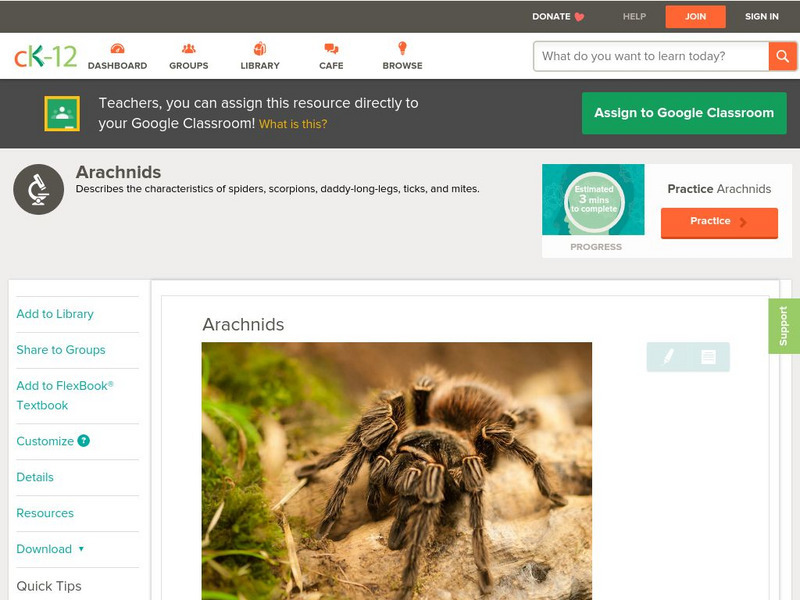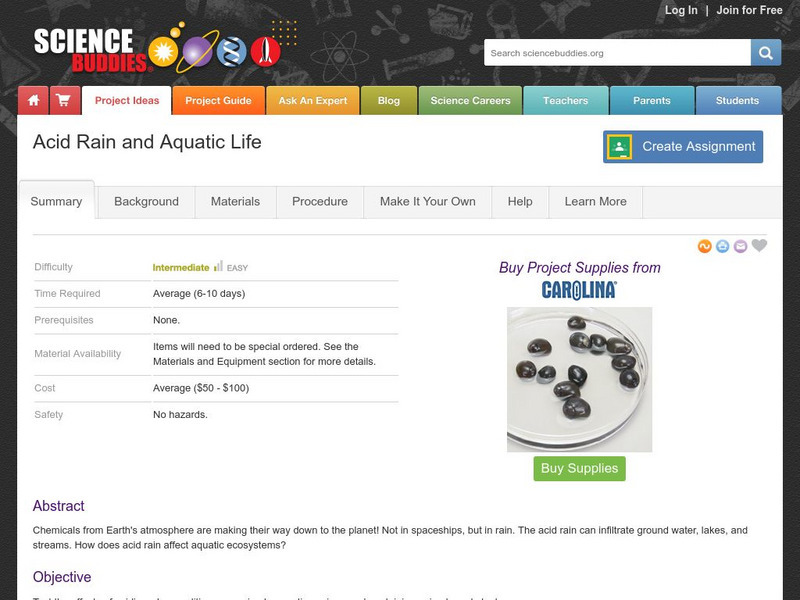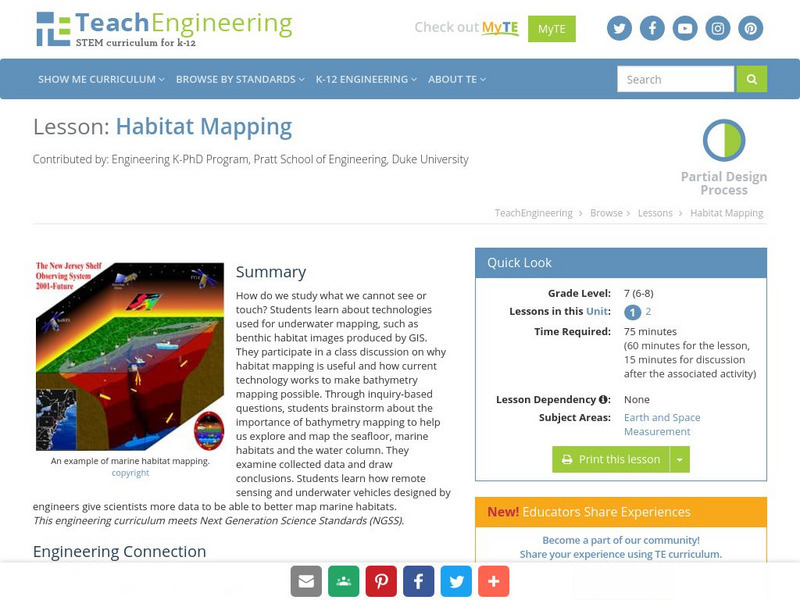Hi, what do you want to do?
American Institute of Biological Sciences
Action Bioscience: Discovering Amazing Life in the Deep Sea
A research biologist at the Monterey Aquarium and a professor at UC-Santa Cruz is interviewed to explain the studies done in the deep sea. Steven Haddock addresses the purpose of uncovering the mysteries of life and environment lying out...
Palomar Community College District
Wayne's Word: Life on Salt Lakes
A fascinating report on some of the living things found in salty environments. There are terrific photos of salt flats colored red by some salt loving bacteria.
Other
Pollution Probe: Mercury in the Environment [Pdf]
High levels of mercury exposure can cause birth defects, permanent brain or kidney damage, and/or death. This resource focuses on the impacts of mercury in the environment. Learn how mercury can reap havoc on lakes and other aquatic...
BBC
Bbc: New Marine Life Found in Deep Sea Vents
Six new animal species are identified at deep-sea vents beneath the Indian Ocean. Find out what new creatures are stirring in the sea.
Other
Ocean Tracks: Fact or Artifact? Interpreting Patterns in Ocean Tracks Data [Pdf]
Ever wonder where marine animals go? How fast they swim? How deep they dive? Electronic tagging has opened a new window into the world of the open ocean. Ocean Tracks gives you access to data collected by tags on real live migrating...
National Geographic
National Geographic: Adapting Under Pressure
Students learn about James Cameron's Challenger Deep dive and about the marine animals that live in different layers of the ocean. They then study the characteristics of the hadalpelagic zone at the bottom of the ocean, and imagine and...
CK-12 Foundation
Ck 12: Life Science: Arachnids
[Free Registration/Login may be required to access all resource tools.] Arachnids are a class of joint-legged invertebrates in the subphylum Chelicerata. They live mainly on land but are also found in freshwater and in all marine...
Other
N. Carolina Dep. Of Environment & Natural Resources: Cool Kids: Crustaceans
There is all kinds of information about crustaceans available at this site from the North Carolina Department of Marine Fisheries. You can see what types of shrimp and crabs are in the area or connect the dots of your own crustacean.
Science Buddies
Science Buddies: Acid Rain and Aquatic Life
Chemicals from the Earth's atmosphere are making their way down to the planet. Not in spaceships, but in rain. The acid rain can infiltrate ground water, lakes, and streams. How does acid rain affect aquatic ecosystems?
Other
Cefas: Our Science
A website focusing on the research done by the Center for Environment, Fisheries, and Aquaculture science that focuses on climate change, marine planning, fisheries management, and sustainability. Website includes information about...
American Institute of Biological Sciences
Action Bioscience: Shifting Baselines: Slow Motion Disaster in the Sea
A baseline is a standard point of reference when measuring various things. The catch phrase, "shifting baselines," refers to the slow changes occurring in the environment that ultimately change what the environment was and what is...
University of Florida
South Florida Aquatic Environments: Florida Keys: About the Keys
The Florida Museum of Natural History offers an excellent review of the reefs, mangrove and seagrass habitats of the Florida Keys. Spend some time learning about this unique location.
Science Buddies
Science Buddies: Home Sweet Biome: How Do Plants Grow in Different Environments?
In this science fair project you will learn about biomes and how different climatic conditions affect plant growth. This can explain why some plants and animals are similar in different areas of the country, and in other parts they are not.
HotChalk
Hot Chalk: Lesson Plans Page: Aquatic Wildlife and Pollution
This lesson plan is designed to teach young children about healthy and hazardous marine and freshwater environments and be able to describe the effects of the pollution of plastics on wildlife.
American Institute of Biological Sciences
Action Bioscience: The Value of Healthy Estuaries
An article featuring the complexity of estuaries which highlight the value these systems have to human and wild life.
American Institute of Biological Sciences
Action Bioscience: America's Oceans in Crisis
Discover some of the current problems within our oceans and how those problems could affect life on Earth.
TeachEngineering
Teach Engineering: Habitat Mapping
The marine environment is unique and requires technologies that can use sound to gather information since there is little light underwater. For this lesson, the learners will be shown benthic habitat images produced by GIS. These images...
Texas Instruments
Texas Instruments: Jason: Pinniped Body Shape Conserving Warmth
From Shore to Sea: To survive in cold ocean environments an organism's body must be adapted to life under water. A body will cool very quickly when in contact with water. The body shape of an organism is one adaptation that helps to...
US Environmental Protection Agency
Epa: Acid Rain
What are the causes and effects of acid rain in our environment? To learn more about this serious environmental issue check out this website. Contains a page with several acid rain activities for students.
The Association of the British Pharmaceutical Industry
Abpi: Human and Animal Habitats
An interactive learning game where students answer whether or not certain environments would be suitable for different animals. Printable worksheets are available for review at the end of the activity.
E-learning for Kids
E Learning for Kids: Science: Australia: How Do Environments Affect Living Things?
Noah lives near the Great Barrier Reef. Go explore this diverse habitat with him.
Canadian Wildlife Federation
Hinterland Who's Who: Seabirds
Get the facts about seabirds. This group of birds makes up about three percent of the various species, even though two-thirds of the Earth is covered in water. Learn some unique facts and characteristics of seabirds. Also included in...
EL Education
El Education: In the Zone: Where the Land Meets the Water
This field guide to the marine organisms of the intertidal zone of Casco Bay was created by 7th grade students in Portland, Maine, as part of a Learning Expedition called, "In the Zone." Students were engaged in scientific research at...
Discovery Education
Discovery Education: Planet Ocean: The Ocean
This site is a one-page introduction to oceans. It provides a basic overview of Ocean life, size, and benefits.





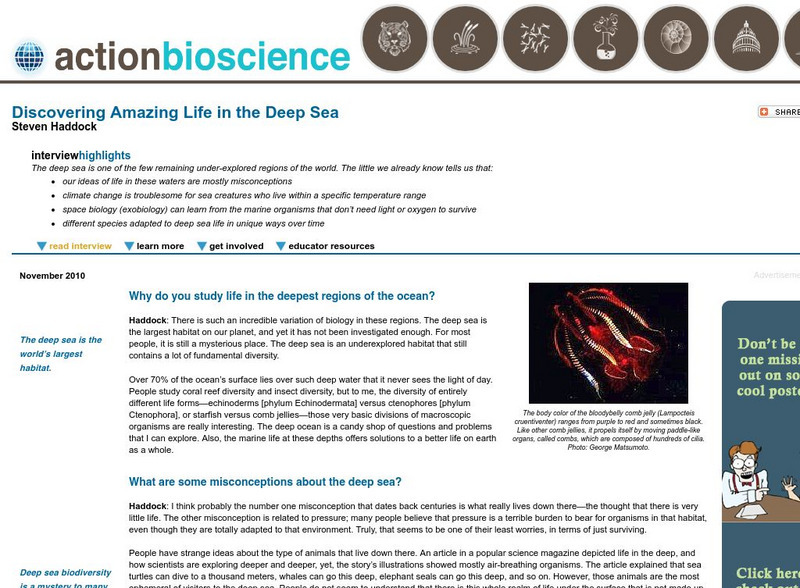
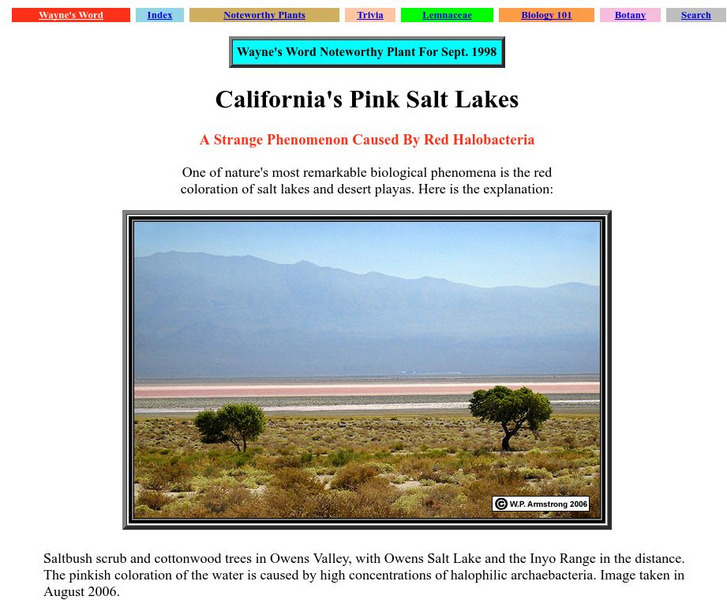
![Pollution Probe: Mercury in the Environment [Pdf] Primary Pollution Probe: Mercury in the Environment [Pdf] Primary](https://static.lp.lexp.cloud/images/attachment_defaults/resource/large/FPO-knovation.png)


